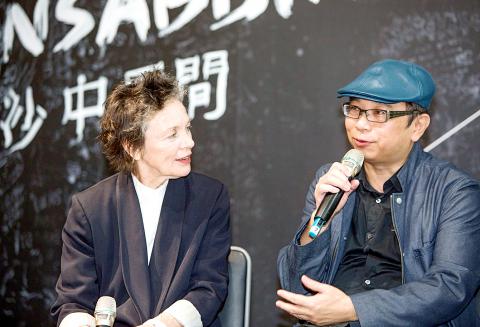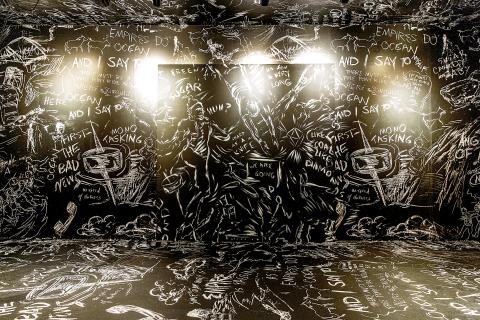US musician/artist/writer/film director Laurie Anderson was back in Taipei last weekend, five-and-a-half years after she appeared at the National Concert Hall for her Delusion production.
This time she was in town to put the finishing touches on, and do promotions for, La Camera Insabbiata at the Taipei Fine Arts Museum (TFAM), the virtual reality (VR) project she created with Huang Hsin-chien (黃心健), a new media artist and professor at National Chengchi University.
The two have collaborated on a number of projects over the years, going back to their 1995 multimedia CD-Rom Puppet Motel.

Photo Courtesy of Taipei Fine Arts Museum
The Italian title stems from the fact that the interactive/immersive show was created for this year’s Venice Film Festival, where it won the award for the Best VR Experience.
However, it is actually a continuation of a project that Anderson and Huang first created for the Massachusetts Museum of Contemporary Art two years ago entitled Chalkroom, although that was done on a smaller scale.
That TFAM closed last month for a nine-month overhaul of its air-conditioning system and galleries was no obstacle to staging a VR show, but it does substantially reduce the number of people who will be able to see it.

Photo Courtesy of Taipei Fine Arts Museum
The museum erected a small building on its plaza to house La Camera Insabbiata, which consists of eight rooms where viewers can enter a virtual world made of blackboards symbolizing “memory” and fly around to explore words, drawings, symbols and sounds.
Only four people are admitted to each 15-minute session, allotted by morning, afternoon and evening slots, and advance online registration is required.
The first week of the show, which opened on Sunday and runs until Feb. 25, was already fully booked.
The registration system will be open again on Monday at 10am for Tuesday through Dec. 3, and each Monday after that for the succeeding week, through the end of the run.
According to Anderson, a viewer, or “reader” as she says, will fly through a structure made of words, drawings and stories, but one where everything is hand drawn, dark and dusty, as she and Huang wanted to create something that is the antithesis of the bright games most people associate with VR.
Visitors have a choice of eight rooms to visit — The Cloud Room, The Anagram Room, The Dog Room (inspired by Anderson’s drawings of her dog), The Water Room, The Sound Room (where users record sounds that turn into 3D objects), The Dance Room, The Writing Room and The Tree Room.
The audio is in English, but Chinese translations will be provided.
The visitor’s voice will also be recorded during the experience and later visitors will hear those recordings.
Each visitor’s viewing will be unique, as they create their own experience by how they move about and interact with each room — or by doing nothing by watching the show unfold before them.
First time users of VR headsets and equipment are warned they may want to sit on the stools provided until they feel comfortable.
Jason Stern of Canal Street Communications, the technical director of the show, told the audience at a forum with Huang about the project on Saturday that one of the unexpected problems they have had was telling people how to experience VR flight.
“People were flying straight into the wall,” he said.
“People are not used to 360 degree freedom. People go straight, hit the wall and panic. They don’t know what to do,” he said. “If you tell them, ‘go left,’ then suddenly they realize they can navigate, they become Superman.”
Which is a nice segue to one of Anderson’s earlier creations, the 1981 pop hit, O Superman, a song about communication and technology issues.
More information on the show and the booking system is available on TFAM’s English and Chinese-language Web site: www.tfam.museum.

Exceptions to the rule are sometimes revealing. For a brief few years, there was an emerging ideological split between the Democratic Progressive Party (DPP) and Chinese Nationalist Party (KMT) that appeared to be pushing the DPP in a direction that would be considered more liberal, and the KMT more conservative. In the previous column, “The KMT-DPP’s bureaucrat-led developmental state” (Dec. 11, page 12), we examined how Taiwan’s democratic system developed, and how both the two main parties largely accepted a similar consensus on how Taiwan should be run domestically and did not split along the left-right lines more familiar in

As I finally slid into the warm embrace of the hot, clifftop pool, it was a serene moment of reflection. The sound of the river reflected off the cave walls, the white of our camping lights reflected off the dark, shimmering surface of the water, and I reflected on how fortunate I was to be here. After all, the beautiful walk through narrow canyons that had brought us here had been inaccessible for five years — and will be again soon. The day had started at the Huisun Forest Area (惠蓀林場), at the end of Nantou County Route 80, north and east

Specialty sandwiches loaded with the contents of an entire charcuterie board, overflowing with sauces, creams and all manner of creative add-ons, is perhaps one of the biggest global food trends of this year. From London to New York, lines form down the block for mortadella, burrata, pistachio and more stuffed between slices of fresh sourdough, rye or focaccia. To try the trend in Taipei, Munchies Mafia is for sure the spot — could this be the best sandwich in town? Carlos from Spain and Sergio from Mexico opened this spot just seven months ago. The two met working in the

This month the government ordered a one-year block of Xiaohongshu (小紅書) or Rednote, a Chinese social media platform with more than 3 million users in Taiwan. The government pointed to widespread fraud activity on the platform, along with cybersecurity failures. Officials said that they had reached out to the company and asked it to change. However, they received no response. The pro-China parties, the Chinese Nationalist Party (KMT) and Taiwan People’s Party (TPP), immediately swung into action, denouncing the ban as an attack on free speech. This “free speech” claim was then echoed by the People’s Republic of China (PRC),